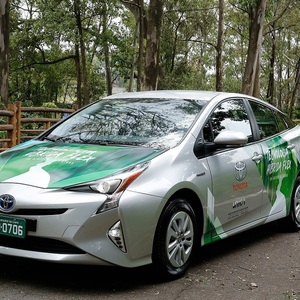Toyota reveals world-first flexible fuel hybrid prototype

Toyota
March 22, 2018
BY Toyota
A prototype of the world's first hybrid flexible-fuel vehicle (hybrid FFV), debuted in an event Toyota recently held in Sao Paulo, Brazil. Stakeholders including the state government, universities, and the sugarcane association (the Sugarcane Industry Union: UNICA) attended the event. The prototype is the combination of a flexible-fuel vehicle (FFV) that can be powered by both gasoline and alternative fuels such as ethanol, and Toyota's famous hybrid system which combines a combustion engine and an electrical powertrain.
Hybrid FFV is a new powertrain system that Toyota is developing with an aim to popularize hybrid electric vehicles in Brazil and contribute to the environment through reduction of CO2 emissions. Hybrid FFV has the potential to drastically reduce total CO2 emissions as it is built on Toyota's hybrid system that has high energy efficiency and low emission levels and it also leverages the CO2 reabsorption capacity of ethanol, a plant-derived 100 percent renewable fuel. The prototype uses the Toyota Prius as a base model, which is currently sold and becoming popular in Brazil.
Advertisement
Advertisement
Toyota's initial studies indicate that hybrid FFV has a great advantage in environmental performance compared to a standard FFV, when we estimate CO2 emissions starting with the extraction of the raw material, through its distribution at the fuel pumps to the ignition in the combustion process of the car. If it is fueled only by sugarcane-based ethanol (E100 fuel), the results are even better.
The development of hybrid FFV represents one of Toyota's efforts to achieve its "Environmental Challenge 2050" where it challenges itself to reduce vehicle CO2 emissions by 90 percent in comparison with 2010 levels, by 2050. Another objective of the Environmental Challenge is to completely eliminate CO2 emissions from the vehicle lifecycle, including materials, parts and manufacturing. In line with that goal, Toyota also targets to have more than 5.5 million electrified vehicles in its global new vehicle sales by 2030.
"I am very proud of our Toyota do Brasil engineers that worked closely with our engineers in Japan to develop the world's cleanest hybrid vehicle that uses ethanol for our Brazilian customers. The invention demonstrates our journey in providing a new mobility society," said Steve St. Angelo, senior managing officer of Toyota Motor Corp. serving as CEO of Toyota Latin America Region and Caribbean, as well as Chairman of Toyota do Brasil.
Advertisement
Advertisement
Toward the commercialization of hybrid FFV in Brazil, Toyota will collect various data through real-world road testing in Brazil going forward and evaluate the system's reliability, durability, and powertrain performance.
Related Stories
The U.S. Department of Energy’s Office of Energy Efficiency and Renewable Energy is soliciting public comments on a preliminary plan for determining provisional emissions rates (PER) for the purposes of the 45Z clean fuel production credit.
On July 17, Iowa’s cost-share Renewable Fuels Infrastructure Program awarded $1.12 million in grants for 20 applicants to add B11 and 4 applicants to add E15 to retail sites. This was the first meeting following the start of RFIP’s fiscal year.
Par Pacific Holdings Inc., Mitsubishi Corp. and ENEOS Corp. on July 21 announced the signing of definitive agreements to establish Hawaii Renewables LLC, a joint venture to produce renewable fuels at Par Pacific’s refinery in Kapolei Hawaii.
A new study published by the ABFA finds that the U.S. EPA’s proposal to cut the RIN by 50% for fuels made from foreign feedstocks, as part of its 2026 and 2027 RVOs, could stall the growth of the biomass-based diesel (BBD) industry.
The European Commission on July 18 announced its investigation into biodiesel imports from China is now complete and did not confirm the existence of fraud. The commission will take action, however, to address some systemic weaknesses it identified.
Upcoming Events










